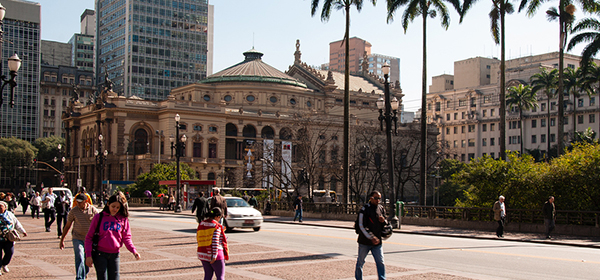Pros and Cons of Living in Brazil
Summary: If you're moving to Brazil, it's important to learn about both the Pros AND Cons of living in Brazil.

Moving to a new country is a life-changing decision that requires careful consideration of various factors. Brazil, with its vibrant culture, diverse landscapes, and dynamic economy, has become an attractive destination for expatriates from around the world. Whether you're drawn to the rhythm of samba, the allure of tropical beaches, or the promise of new economic opportunities, Brazil offers a unique experience that is both exhilarating and challenging. In this feature, we delve into the advantages and disadvantages of setting up your new home in this South American gem, providing you with a comprehensive guide to help you weigh your decision.
Pros of Living in Brazil
Imagine waking up to the sound of waves crashing on the shore, the scent of fresh tropical fruit wafting through the air, and the warmth of the sun gently coaxing you to start your day. This is a reality for many who choose to call Brazil their home. The nation's natural beauty is undeniable, with an array of landscapes that include pristine beaches, lush rainforests, and majestic waterfalls. But Brazil's appeal extends far beyond its physical allure. One of the most significant advantages of living in Brazil is the cost of living. Compared to many Western countries, the cost of housing, food, and services is relatively low. This affordability allows expatriates to enjoy a comfortable lifestyle without the financial strain they might experience elsewhere. For instance, in cities like Fortaleza or Natal, one can rent a spacious beachfront apartment for a fraction of what it would cost in a coastal city in the United States or Europe. The Brazilian culture is another draw. Known for its warm and welcoming people, Brazil offers a social environment that is both inclusive and festive. Brazilians place a high value on family and community, often gathering for barbecues, parties, and celebrations that are infused with music and dance. Expatriates often find themselves quickly embraced by local communities, making new friends and forming connections that enrich their experience. For those seeking professional opportunities, Brazil's growing economy presents numerous possibilities. The country has a burgeoning tech industry, a strong agricultural sector, and is a leader in several other economic areas. Entrepreneurs and investors may find fertile ground for new ventures, particularly in cities like São Paulo, which is the business hub of South America. Brazil's healthcare system is also a point of interest. The country offers a universal healthcare system, SUS (Sistema Único de Saúde), which provides free medical care at the point of service. While the public system faces challenges, there are also many private healthcare options that offer high-quality services at reasonable prices, especially when compared to the costs in the United States. Education in Brazil can be a pro for those moving with families. There are numerous international schools that offer high-quality education and follow various international curricula, making the transition easier for children and ensuring continuity in their education. The Brazilian lifestyle is one that celebrates the outdoors and physical activity. From football to volleyball, to martial arts like capoeira, there are endless opportunities to stay active and healthy. The country's passion for sports is contagious, and residents can take advantage of the many parks, beaches, and sports clubs available to them. Lastly, the culinary experience in Brazil is nothing short of delightful. The cuisine is a blend of indigenous, African, and European influences, resulting in a variety of flavors and dishes that are both delicious and unique. From the hearty feijoada to the refreshing açaí bowls, food lovers will find themselves on an endless gastronomic adventure.Cons of Living in Brazil
While the allure of Brazil is strong, it's important to acknowledge the challenges that come with living in this diverse country. One of the most pressing issues is safety. Brazil has a high crime rate, and while this varies by region, it's a concern that residents must take seriously. Expatriates are advised to live in secure neighborhoods, be cautious with their belongings, and avoid certain areas at night. Stories of petty theft and more serious crimes are not uncommon, and it's essential to be vigilant and informed. The bureaucracy in Brazil can be overwhelming for newcomers. The process of obtaining visas, registering for services, and dealing with government agencies is often complicated and time-consuming. The infamous "Brazilian red tape" can be a source of frustration for those accustomed to more streamlined systems. For example, opening a bank account or securing a driver's license can take much longer than expected, requiring multiple documents and visits to various offices. Infrastructure is another area where Brazil faces challenges. While the country has made significant strides in development, there are still issues with transportation, sanitation, and public services. Traffic congestion in major cities like Rio de Janeiro and São Paulo can be nightmarish, and public transport options may not always be reliable or comfortable. Additionally, power outages and water shortages can occur, particularly in more remote areas or during periods of heavy rain. The language barrier is a significant consideration for anyone moving to Brazil. Portuguese is the official language, and while English is spoken in some business and tourist areas, a basic understanding of Portuguese is essential for daily life. This can be daunting for those who have not had prior exposure to the language, making simple tasks like shopping or visiting the doctor more challenging. Education, while a pro for some, can also be a con. Public schools in Brazil often lack resources and quality teaching, which can be a concern for expatriates with children. While international schools offer a solution, they can be expensive, limiting options for families on a tighter budget. The political climate in Brazil is complex and often volatile. Political corruption has been a persistent issue, leading to widespread protests and unrest. For expatriates, this instability can be unsettling and can impact the economy and daily life in unpredictable ways. Lastly, the healthcare system, despite its universal access, is strained. Public hospitals and clinics may be overcrowded, and waiting times for treatment can be long. While private healthcare provides an alternative, it comes at a cost, and depending on the location, the quality of care can vary significantly. Living in Brazil is a study in contrasts, offering a rich tapestry of experiences that can be both rewarding and challenging. It's a country that demands resilience and adaptability from its residents but also offers a depth of culture, beauty, and warmth that can make the journey well worth it. Those considering a move to Brazil should weigh these pros and cons carefully, seeking to embrace the vibrant life that awaits while being prepared for the hurdles they may encounter.
About the Author
 Betsy Burlingame is the Founder and President of Expat Exchange and is one of the Founders of Digital Nomad Exchange. She launched Expat Exchange in 1997 as her Master's thesis project at NYU. Prior to Expat Exchange, Betsy worked at AT&T in International
and Mass Market Marketing. She graduated from Ohio Wesleyan University
with a BA in International Business and German.
Betsy Burlingame is the Founder and President of Expat Exchange and is one of the Founders of Digital Nomad Exchange. She launched Expat Exchange in 1997 as her Master's thesis project at NYU. Prior to Expat Exchange, Betsy worked at AT&T in International
and Mass Market Marketing. She graduated from Ohio Wesleyan University
with a BA in International Business and German.
Some of Betsy's articles include 12 Best Places to Live in Portugal, 7 Best Places to Live in Panama and 12 Things to Know Before Moving to the Dominican Republic. Betsy loves to travel and spend time with her family. Connect with Betsy on LinkedIn.
Additional Information:
- Brazil Guide
- Healthcare & Health Insurance in Brazil
- Members Talk about Healthcare & Health Insurance in Brazil
- Best Places to Live in Brazil
- Real Estate in Brazil
- Guide to Real Estate in Brazil
- Pros & Cons of Living in Brazil
- Cost of Living in Brazil
- Best Places to See While on a Look-See Trip to Brazil (Plus, Itineraries)
- Moving to Brazil with a Pet
- Understanding Mental Health in Brazil
- Is Health Insurance Required When Moving to Brazil?
- 2025 Guide to Living in Brazil
- Pros and Cons of Living in Brazil 2025



